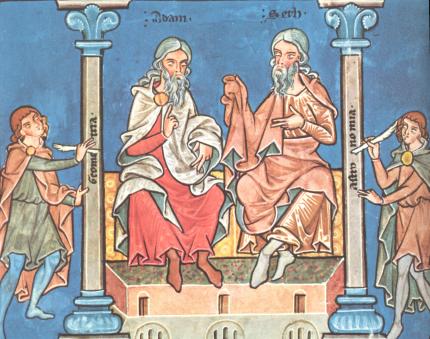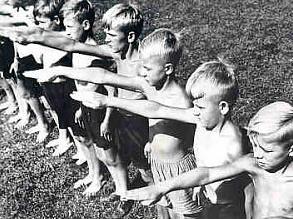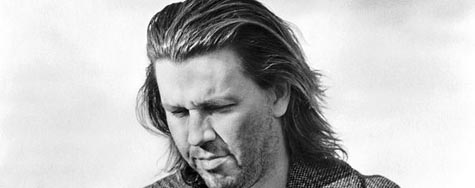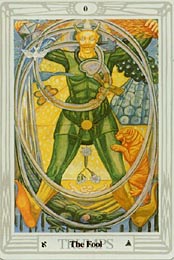
The madman is not the man who has lost his reason. The madman is the man who has lost everything but his reason.
— G.K. Chesterton —
We have become a nation of experts.
They are everywhere: on TV, advising us about raising our children or improving our sex life; in magazines and newspapers, lending a measure of weight to opinion pieces disguised as news; in business, promising to improve productivity and bolster profits through higher productivity, or slicker marketing, or yet another reorganization or “team-building” project. They are ubiquitous in government and politics, lending credence to the implausible and certainty to the unpredictable. Armed with statistics, and studies, and the ethereal proclamations of other unnamed experts like unto themselves, they saturate our psyche with innumerable “facts” and figures, that we may live perfect lives in an imperfect world. The chaos which swirls around us need not engender fear and hopelessness — there will always be an expert to hold your hand, lest you become lost and wander from life’s perfect path.
Intimidated by their credentials and self-assured certainty, we slowly relinquish the uneasy feeling that their advice and conclusions invariably run counter to our experience, and common sense, and the simple wisdom of life acquired through parents and parish, logic and lore. Theirs is a relentless battering of our natural defenses, made ever more potent by lives lived without margin, frantically running to and fro, pursuing the very goals our experts have set forth, while quietly dying to the insight gained by simplicity and satisfaction with life’s precious but fragile treasures. Their strident advocacy drowns out the the quiet wisdom whispered to the soul in contemplation and prayer, found only in reflection and the fertile soil of rich relationships.
The fecklessness of our experts is often utterly dispensable, if annoying, as our guilded guides waffle from truth to contradictory truth: “Take estrogen!” “Don’t take estrogen!” “All fats are bad!” “These fats are good!” “Sun causes cancer!” “Sun prevents cancer!” What is true today will be foolishness tomorrow — and nary a hint of humility will be heard from those who hustled us mere months before.
As our increasingly secular and superficial culture abandons the transcendent truths of faith and the tested wisdom of tradition, we search desperately for a lodestone upon which to ground our lives, and so trade trust and belief in transcendent and transformational absolutes for fear and the desperate desire to control the world which has become our enemy. We frantically cling to every proffered proof, no matter how foolish or feckless, seeking something upon which to ground and anchor our lives. As these sands shift dangerously beneath our feet, we lurch and stumble from fragile branch to broken rail, as we stagger along a path which leads ever downward.
Yet the allure of the experts can prove far more destructive than mere personal angst in a turbulent, fast-moving world: how many listened to the professionals who told us we could not lose in real estate? Leverage to the max, it can only go up! The consequences across the economy have been devastating — except for those who sold us this sage advice. These “experts” understood the game far better than the market, and walked away unscathed and wealthy, leaving only our wreckage in their wake.
Our dependence on the guidance of scientists, economists, educators, and technocrats proves especially toxic when their expertise becomes wedded to money and political influence. Under the guise of shielding us from the complexity of their disciplines, they evolve into closed guilds, guardians of a secret knowledge which we, in our harrowed and hectic lives, have no time and little interest in understanding. As our educational system — itself run by a closed guild — produces generations of students tutored in woman’s studies, postmodern deconstructionism, and the evils of the West, yet ignorant of logic, philosophy, and the rigors of the hard sciences, the problem is compounded. We increasingly are left with little recourse but to trust those who guard and disperse the hidden knowledge we no longer comprehend. Our gnostic masters dispense their wisdom; ours is but to nod, and obey.
Nowhere can this process better be seen than the unfolding drama surrounding the East Anglia email scandal. Centered on one of the three major centers for climate research and data in the world, the hacked emails and software code have ripped open the veil to show us the inner sanctum of science utterly corrupted and politicized. At issue is anthropogenic global warming (AGW) — the theory that recent warming trends in global temperatures are caused by rising levels of carbon dioxide from human activity, fostered by industrialization. It has long been a theory which struggled to pass the sniff test, placing undo weight on a trivial component of so-called greenhouse gases, while ignoring the enormous (and obvious) impact of solar activity, water vapor, and cloud cover. Yet for years we have been told — in increasing shrill and strident tones — that this theory is “settled science,” and there is an imminent crisis at hand.
It has been fascinating to watch this ball of yarn unravel. In what may prove to be the greatest hoax mankind has ever witnessed — most certainly the one with almost unimaginable financial impact globally — we are watching the “settled science” of AGW disintegrate. We read how data was manipulated to hide declining global temperatures and make them appear to be rising sharply (“Mikes nature trick“). The peer review process made sure no contrary or skeptical opinions were published, and efforts were made to delegitimize journals which published such articles. Proxy data such as tree-rings were cherry-picked to ensure that the data conformed to the AGW philosophy. FOIA requests for data were met with stonewalling and destruction of raw data. The homogenization of temperature station data — making adjustments to the temperatures to reflect changes in the surrounding environment, such as urbanization — showed shows striking and arbitrary adjustments to demonstrate a sharp rise in temperatures when no such changes existed in the raw data. Other major climate research centers are similarly stonewalling raw data requests. The data problems just scratch the surface; the software used to generate reports and alarmist graphs was incompetently written by amateur programmers — and could not even reproduce the graphs from the original data without massive software hacks and fudge factors — by the programmer’s own admission.
The response of climate scientists to these devastating revelations? Denial and attack. The response of the UN Climate gurus and American and Western policy makers? Denial and attack. The response of the media to this massive global meltdown of AGW “settled science? Silence.
Amazing.
Whatever the role of human activity in global warning, one thing is abundantly evident: the current “science” of AGW is not really science at all, but more closely resembles a pernicious, cultic religion. Its priesthood holds the secret knowledge about “climate change,” and we the fools who question or challenge them engender naught but condemnation, ridicule, hatred and disdain. For the priesthood and the true believers who bow to them, the payoff for guarding their secrets are huge: for our scientist priests, millions in research grants, often at taxpayer expense; for the evangelists (Al Gore comes to mind), the ability to engender hysteria with wild, apocalyptic climate claims while raking in millions on carbon trading and investments in “green” technology; for the politicians, the opportunity to further extend the control and power of government into every aspect of its citizens lives while pocketing huge political contributions from environmental groups and green industries.
We have been lectured endlessly by our postmodern mentors that religion is naught but ignorance and superstition, while scientific “facts” are Truth. But “knowledge is power,” as the saying goes — especially when the knowledge can be hidden behind a veil of secrecy, manipulated at will to conform to unchallengeable presuppositions and philosophies, then relentlessly drilled into our collective consciences through compliant and complicit channels of media, education, and politics.
The climate scientists are hardly alone in such gnostic gambits; evolutionary biology — whose “scientists” seem to spend most of their efforts proving that God doesn’t exist rather than demonstrating that their tattered and threadbare theories of evolution have an actual basis in reproducible science and genetics, and a demonstrable and reliable predictive value (which all solid science must have) beyond the the pure speculation and projection that comprises most evolutionary science. Think I’m being a crazy fundamentalist creationist? Try, as a scientist, to demand that evolutionists satisfactorily answer any host of devastating challenges to their theories: the irreducible complexity of biological subsystems such as the eye, the cellular mitochondria and intracellular protein factories; the entropy problem (complex systems tend naturally to disorder and chaos, not more complexity); the Cambrian explosion; the impossibly long odds that all physical constants stood at precisely the correct values at the instant of the Big Bang; the enormous problem of free will, higher intellect, and purpose in the human animal which has no precursors in lesser beasts. Challenge these — even with understated, respectful, and serious questions — and watch how quickly the ad hominem attacks begin, how quickly you will be excluded from “peer reviewed” literature, ridiculed and ostracized, and labeled as an ignorant creationist fundamentalist, an enemy of science — or worse.
In our repudiation of a world based on absolutes and transcendency, our free fall into secularization has ironically left us clinging to science as our sole absolute, our foundation in a world which no longer makes sense, in which there are no true absolutes. Yet science cannot bear such weight alone, detached as it has become from notions of absolute truth and the true nature of the creation that is man and his universe. It has become instead a tool of power, and manipulation, and deception. The ship of knowledge no longer has an anchor, and drifts aimlessly toward the rocks of self-righteous deception and the shoals of arrogance.
G.K. Chesterton, writing nearly a century ago, mused that “this is the age in which thin and theoretic minorities can cover and conquer unconscious and untheoretic majorities.” What was true then is ever more true today, as we relinquish our own convictions and the truths which come by faith and tradition for the perilous tyranny of rule by experts. True freedom requires absolute truth, with its liberating transparency and the humility of knowing we are not gods. Science detached from absolutes will not bring progress but peril, not truth but tyranny. In our quest for the Utopia which technology enticingly promises, to forget our foundational truths is to invite disaster and slavery.
Sadly, we are already well on our way.
 The recent arrest of Roman Polanski for statutory rape with a 13-year-old girl has peeled back the veil covering our cultural decay. Numerous artists, directors, and other Hollywood celebrities and powerbrokers have come out and condemned the arrest, while rationalizing his behavior and condemning what they see as unjust punishment. The public response to this has been somewhere between shock and revulsion, with many commentators, even the New York Times editorial page, expressing surprise and dismay at Hollywood’s response to a man who drugged and raped a minor.
The recent arrest of Roman Polanski for statutory rape with a 13-year-old girl has peeled back the veil covering our cultural decay. Numerous artists, directors, and other Hollywood celebrities and powerbrokers have come out and condemned the arrest, while rationalizing his behavior and condemning what they see as unjust punishment. The public response to this has been somewhere between shock and revulsion, with many commentators, even the New York Times editorial page, expressing surprise and dismay at Hollywood’s response to a man who drugged and raped a minor.



 A recent post on the worldview of contemporary postmodern liberalism was kindly linked by Gerard Vanderleun over at
A recent post on the worldview of contemporary postmodern liberalism was kindly linked by Gerard Vanderleun over at 